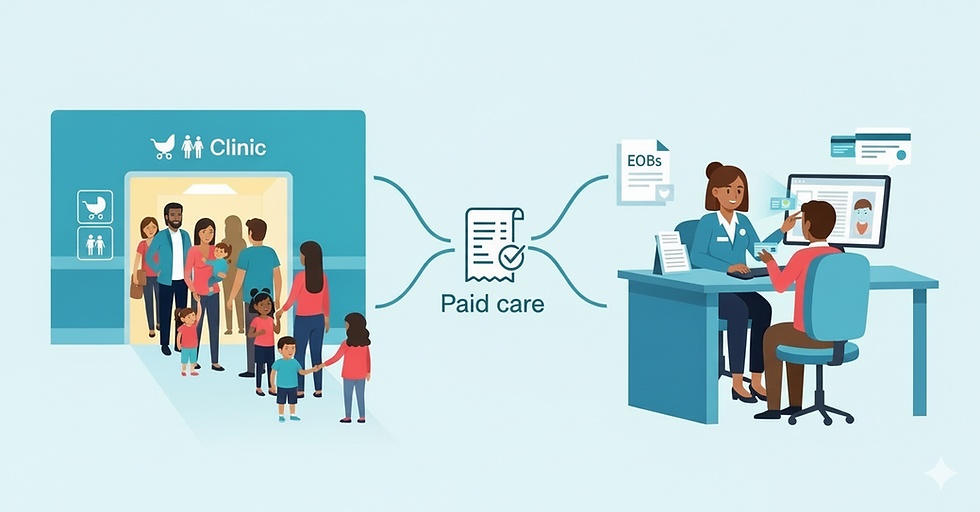Navigating the Storm: The Uphill Battle of Mental Health Insurance Billing
- Nicholas Burt, LMFT

- Aug 15, 2023
- 3 min read
In today's complex world, access to proper mental health care is essential for individuals and families alike. However, a recent article titled: Families fall deep in debt for mental health care. Why is insurance so spotty? sheds light on a concerning issue that many families face when seeking behavioral health treatment: the challenging landscape of insurance billing. This article delves into the struggles families encounter while trying to secure insurance coverage for mental health care, revealing a system that often leaves them burdened with debt and frustration. We have summarized some of the article's key points, below.
Insurance Hurdles and Denials
Unfortunately, the troubling trend of insurance companies frequently denying coverage for essential behavioral health treatments continues. Families, already grappling with the emotional toll of seeking help for their loved ones, find themselves navigating a labyrinthine system of denials and complex billing processes. According to the article, "Insurers denied 18.4% of behavioral-health claims in 2019," painting a stark picture of the uphill battle families are facing.
The Mental Health Parity and Addiction Equity Act (MHPAEA)
While the MHPAEA was established with the noble intention of guaranteeing equitable coverage for mental health treatments on par with physical health, the practical implementation frequently falls disappointingly short of this aspiration. The article brings to light the formidable obstacles that hinder the effective enforcement of this act. Despite the legal provisions, insurance providers have managed to exploit loopholes and adopt strategies that sidestep the spirit of the law. This unfortunate reality has led to a glaring disparity in the reimbursement rates for behavioral health services, leaving many individuals and families grappling with insufficient coverage and facing undue financial strain. The discrepancies between the intended impact of the MHPAEA and the actual outcomes expose a pressing need for more rigorous oversight and reform within the insurance industry.

Numbers Speak Louder Than Words
Concrete data further emphasizes the gravity of the situation. The article presents alarming statistics that underscore the challenges families and individuals face when it comes to mental health insurance billing. According to the article, "Nationally, almost 60% of people with mental illnesses who faced barriers to getting treatment said high costs and lack of health insurance coverage were factors.". Additionally, the article highlights that "insurance paid less than half of what families and insurers billed for inpatient treatment" for behavioral health, creating undue financial strain families experience due to inadequate coverage. These numbers serve as a wakeup call, illustrating the urgent need for reform in the insurance billing landscape to provide fair and equitable coverage for all. As these figures become more tangible, they not only highlight the pressing issue but also urge us to take action and work towards a system that prioritizes the well-being of those seeking essential mental health care.
Advocacy in Action
In the face of this daunting scenario, companies like Bridgeway Billing step in as advocates for patients and their families. The current state of the industry highlights the necessity of organizations like Bridgeway Billing to champion the rights of patients, navigating the complex insurance billing process on their behalf. This advocacy becomes a beacon of hope for families struggling to secure the necessary coverage for their loved ones' behavioral health treatments.
A Call for Change
It's evident that the status quo is far from satisfactory. The article points to the glaring fact that insurance companies often fail to provide fair compensation for mental health treatment. This leads us to question the system's integrity and advocate for change. At Bridgeway Billing, we echo the sentiment that it's imperative to stand up for patients and their families, ensuring they receive the support they need without being financially burdened.
In Conclusion
In the battle for accessible and affordable mental health care, the challenges of insurance billing cannot be overlooked. This recent article reminds us that change is necessary. As the insurance landscape evolves, the collective efforts of advocates, families, and providers will undoubtedly play a crucial role in ensuring that mental health care is no longer overshadowed by financial obstacles.
If you, someone you know, or your business need help getting insurance to pay for treatment, please don't hesitate to reach out.




Comments